
Welfare
Health and Social Welfare
Core Functions
The Vertical carries out assessments and studies, capacity-building initiatives, knowledge exchange discussions, participation in policy dialogues, and the formulation of working papers and action plans on Health, Family Welfare, and Welfare of the Weaker Sections in consultation with line departments
Sectoral Discussions
The Health and Social Welfare Vertical facilitates regular interactions with officials from its sectoral departments, to align stakeholders with the latest developments in the State and/or Union government schemes and flagship programmes. These discussions foster the sharing of best practices, the identification of sector-specific challenges, and strategic planning for the future. The Members of the Planning Commission contribute crucial insights and endorse optimal practices, and their recommendations are presented to the government as studies, assessments, and policies with recommendations
Research & Knowledge Sharing
The organization conducts independent or collaborative research studies with research institutions to explore emerging issues in the Health and Social Welfare sector. These efforts focus on identifying gaps and challenges in the execution of flagship programs, policies, and schemes for the betterment of vulnerable segments in society.
Sectoral Departments
This Vertical coordinates with the following sectoral departments and their line departments:
Health & Family Welfare Department
- Directorate of Public Health and Preventive Medicine
- Directorate of Medical and Rural Health Services
- Directorate of Medical Education and Research
- Directorate of Family Welfare
- Directorate of Indian Medicine and Homoeopathy
- National Health Mission- Tamil Nadu and State Health Society
- Tamil Nadu Health Sector Reforms Programme
- Directorate of State Health Transport
- Tamil Nadu AIDS Control Society
- Directorate of Tamil Nadu Medical Services Corporation
- Directorate of Food Safety & Drug Administration
- Tamil Nadu Medical Services Recruitment Board (TNMRB)
Social Welfare and Women Empowerment Department
- Directorate of Social Welfare
- Directorate of Social Defense
- Directorate of Integrated Child Development Services (ICDS) Scheme
- Tamil Nadu State Commission for Protection of Child Rights
- Tamil Nadu State Commission for Women
Adi Dravidar and Tribal Welfare Department
- Directorate of Adi Dravidar Welfare
- Directorate of Tribal Welfare
- Tamil Nadu Adi-Dravidar Housing Development Corporation Ltd
- Tamil Nadu State Commission for Adi-Dravidar and Scheduled Tribes
Backward Classes, Most Backward Classes, and Minorities Welfare Department
- Directorate of Welfare of Backward Classes
- Directorate of Welfare of Most Backward Classes
- Directorate of Most Backward Classes & Denotified Communities Welfare
- Directorate of Minorities Welfare
- Tamil Nadu Backward Classes Economic Development Corporation
- Tamil Nadu Minorities Economic Development Corporation
Welfare of Differently Abled Persons Department
- Department for the Welfare of Differently Abled
Assessments & Studies
Public Health
Maternal and Child Health
Tribal Issues
Nutrition
Disabilities and Health
Elderly Healthcare
AYUSH and Alternative Medicine
Social Welfare and Development
An Evaluation Study on the Effectiveness of Implementation of Government Schemes in the Tribal Villages in the State of Tamil Nadu
The goal of the tribal development programs implemented for the welfare of the tribal is to reduce the developmental gap between tribal and other communities in the society. This study documents the impact of various development Read More
The issues of Malnourishment in the first 1000 days of children in Tamil Nadu with specific reference to Convergence
The First 1000 Days: A Crucial Window for Child Development
Given the importance of early childhood care in sustaining and improving adult health, it is imperative to address issues around malnutrition during the first 1,000 days of life. This period, encompassing pregnancy, infancy, and Read More
A Comparative Assessment Using Multi-Sectoral Public Health Indicators at District Level in Tamil Nadu
Improving public health involves more than just traditional preventive measures; it requires a comprehensive approach considering factors like water, sanitation, hygiene, and nutrition. This study in Tamil Nadu compares different Read More
Mediating causes for high-level of infant mortality at Thondamuthur Block in Coimbatore District
This study on infant mortality in the Thondamuthur Block, Coimbatore District, found that social and behavioral factors play a crucial role. Despite efforts to explore causes, using econometric models, public health services Read More
A Pilot Study of Iron Deficiency Anaemia, Vitamin D Status and Health Awareness in Children of Rural Tamil Nadu
Despite longstanding policies and programs, over 70% of young children in most Indian regions still suffer from anemia, posing irreversible harm to their development. The study in rural Tamil Nadu assessed iron and vitamin D Read More
A Study of the Kaadar Tribe in Vaalpaarai
The study assesses the educational and income status of the Kaadar tribe, aiming to improve their living conditions. Objectives include creating family cards for education and income, devising age-appropriate education strategies, and identifying tailored entrepreneurship activities. Read More
A Study Report on vitamin D status in exclusively breastfed infants between 3 and 6 months of age and its correlation with various infant and maternal factors – A prospective observational study
This study explores the Vitamin D status in exclusively breastfed infants aged 3–6 months and its correlation Read More
Antibiotic Stewardship Programme: Co-ordinated interventions to measure the appropriate use of antibiotics to help control infections by drug-resistant pathogens in hospitals
The Antibiotic Stewardship Programme tackles the rising threat of infections from drug-resistant pathogens by ensuring judicious use of antibiotics in hospitals. Read More
A Study Report on "Nutritional Status and Prevalence of IDA in Anganwadi Children and the Effect of Iron Supplements"
The study, conducted between June and December 2015 near SIMS Hospital, Vadapalani, evaluated the nutritional status and iron deficiency anemia (IDA) prevalence in children across eight Anganwadi centers. Read More
Project Report of the Early Detection of Disabilities and Institution based Registry of Birth Defects
The Project Report on Early Detection of Disabilities and Institution-based Registry of Birth Defects establishes an ongoing surveillance program for systematic data collection and analysis. Read More
Workshops
Public Health
Maternal and Child Health
Tribal Issues
Nutrition
Disabilities and Health
Elderly Healthcare
AYUSH and Alternative Medicine
Social Welfare and Development
Workshop Report on Management Practises Related to Maternal and Infant Health in Tamil Nadu
Maternal health encompasses the well-being of women during pregnancy, childbirth, and the postpartum period. While motherhood is generally viewed as a positive experience, for many women, it is associated with suffering and health challenges. Despite notable progress since independence, our nation remains deficient in basic health parameters, particularly maternal and infant health. Maternal and newborn health are intricately connected, with social determinants influencing outcomes. Poverty is a key factor Read More
Workshop Report on Management of Lifestyle Diseases through AYUSH
Over the past century, the world has witnessed significant progress, not only in terms of economic advancements and the globalisation of trade but also in the realm of science, particularly medicine. As economic developments unfolded, lifestyles underwent a transformation with implicit consequences. While medicine has made remarkable strides, eradicating many diseases prevalent in the 19th century, the current generation faces a new set of health challenges known as “lifestyle diseases.” Read More
Workshop Report on Health Insurance Schemes for Senior Citizens
Health, an asset for everyone regardless of age, becomes a significant concern as one age, necessitating adequate health coverage. Upon reaching retirement age, a person’s steady income ceases, and health-related expenses can deplete savings. The escalating costs of healthcare pose a substantial obstacle, impeding the elderly from effectively managing their health. This is where Health Insurance Policies play a crucial role, providing reimbursement for hospitalisation costs incurred due to unforeseen health issues, subject Read More
Workshop Report on Welfare of Weaker Sections – Geriatric Care
Ageing is an irreversible biological process that universally impacts every human being. The demographic ageing of populations has far-reaching implications at both macro and household levels. While this phenomenon has traditionally been more pronounced in developed countries, it is now accelerating in developing nations like India, which boasts the world’s second-largest aged population. The extension of life spans has led to an increase in chronic functional disabilities, creating a demand for assistance in managing everyday Read More
Workshop Report on Skill Development of Tribal Youth
Tamil Nadu is characterized by a surplus of labour. The most scarce resource in the state is skilled labour, and this shortage hampers the pace of economic growth. The tribal population faces additional challenges in skill development due to the remote locations of their residences in hilly and forested areas, making the delivery of public services challenging. This lack of skill development among tribal youth becomes a barrier to empowerment and the achievement of the Human Development Index (HDI). Recognizing the centrality of capacity-building in policy prescriptions, tribal development Read More
Workshop Report on Psychological Problems of Children in the Homes under Juvenile Justice System
Research indicates that children thrive when nurtured in a disease-free and supportive environment, as their psychological development is profoundly affected otherwise. Juvenile Justice system homes aim to provide a unified space for children, focusing on rehabilitation. However, the current system often restricts free-thinking, action, and movement, exposing children to a confined outlook. To address these issues and enhance the psychological well-being of children in such homes, it is imperative to introduce a more inclusive Read More
Workshop Report on Early Childhood Education in Anganwadi Centres
Early childhood education holds immense importance, as approximately 90% of a child’s brain development and cognitive skills occur before the age of three. During this critical period, special attention is required, encompassing tender care, balanced nutrition, and intellectual stimulation through education. Recognizing the significance of this phase, both the central and state governments have implemented various schemes and programs to cater to the needs of young children. Read More
Government interventions during early childhood focus on providing a comprehensive package of services, including education, healthcare, and nutrition. Establishing proper linkages between Anganwadi centers and schools is crucial to ensure a seamless transition. The Integrated Child Development Service (ICDS) stands out as a vital scheme, offering a unified platform for services such as nutrition, childhood education, pre-school care, health, supportive services, and convergence. This universalized scheme has positively impacted childhood education and contributed to the improvement of health and the well-being of lactating mothers across all development blocks. In addition to ICDS, the Sarva Shiksha Abhiyan (SSA), a flagship program of the Government of India, has made significant progress in the educational realm. Aimed at reducing dropout rates and increasing enrollment and retention rates, SSA plays a crucial role in fostering childhood education. Beyond academic learning, the program also focuses on instilling positive values in children, contributing to their holistic development.
Workshop Report on Controlling Anaemia through the Indian System of Medicine
The incidence of anemia is due to undernutrition and malnutrition in children, and the adverse impact of anemia on morbidity and mortality is very high. In addition to this, anemia results in a potential loss of output to the economy by affecting earning capacity, the longevity of life, and huge medical costs for individuals. Viewed from the above perspective, the incidence of anemia should be eliminated through proper identification and treatment of the problem and taking prophylactic measures. Those who Read More
Workshop Report of Long-Term Solutions for Neuro–Muscular Disorders
The motors of rapid economic development are capital accumulation, human resource accumulation, and technological advances. Of these three ingredients of growth and development, the second, namely, human resource development, is critical in the sense that it not only enhances labour productivity but also ignites technological advances which endanger positive spillover in the economy. Viewed from this perspective, human resource development is to be fostered and nurtured to a greater extent. Read More
Health Children contribute significantly to the process of development at their productive age. Muscular Dystrophy disorder is one of the terminal and progressive diseases that causes physical impairment in children. If the growth and development of a child become stunted, the very purpose of accumulating human resources will be defeated, and the contributions made by labour will go down at a diminutive rate. Eventually, the objectives and aims of the Five Year Plan could not come to fruition. In so far as Muscular Dystrophy is caused by a genetic disorder, the government and non-governmental organizations have to act together to tackle this problem with a holistic approach. The practical solution to this insurmountable disease lies in the strategy of diagnosing children afflicted with a muscular disorder. The strategy involves a thorough screening of the health status of the children.
Workshop on Addressing Health Issues through Community-based Groups
Promoting health and nutrition can have a lasting positive impact on the economy. Good health is especially crucial in the context of economic development, as it enhances labour productivity. Both the central and state governments have prioritised healthcare delivery systems and the development of health infrastructure in both urban and rural areas across successive plan periods. Despite the active involvement of both private and public sectors as primary health providers, there is a concerted effort to engage NGOs and other community Read More
Community-based entities such as Self Help Groups (SHGs) and Non-Governmental Organizations (NGOs) are encouraged to concentrate on enhancing nutritional status, improving overall health, and preventing terminal illnesses like cancer. The workshop also delved into aspects of healthcare delivery and the enhancement of nutritional status.
Ongoing Works
Current Studies
- Chief Minister’s Breakfast Scheme: Impact on Children in Primary classes in Government Schools
- Evaluation of Pudhumai Penn Scheme
- Socio-economic background of SAM and MAM children
- Performance of Government Hospitals at Taluk and Non-taluk level
- Performance of Siddha Healthcare clinics in PHCs and hospitals
Gallery
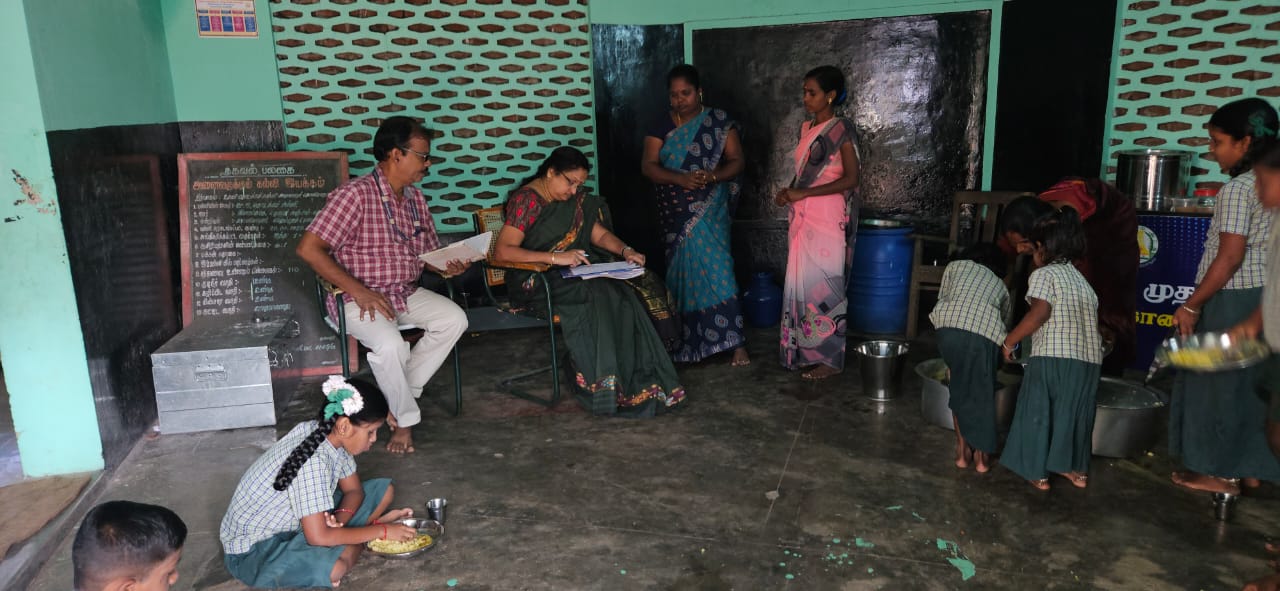
C.M Breakfast Scheme Evaluation 1
C.M Breakfast Scheme Evaluation 1
ICMR Field Investigator assessing the records at the Panchayat Union Middle School, Ilangadu Panchayat, Villupuram district, as part of the assessment of the Chief Minister Breakfast Scheme
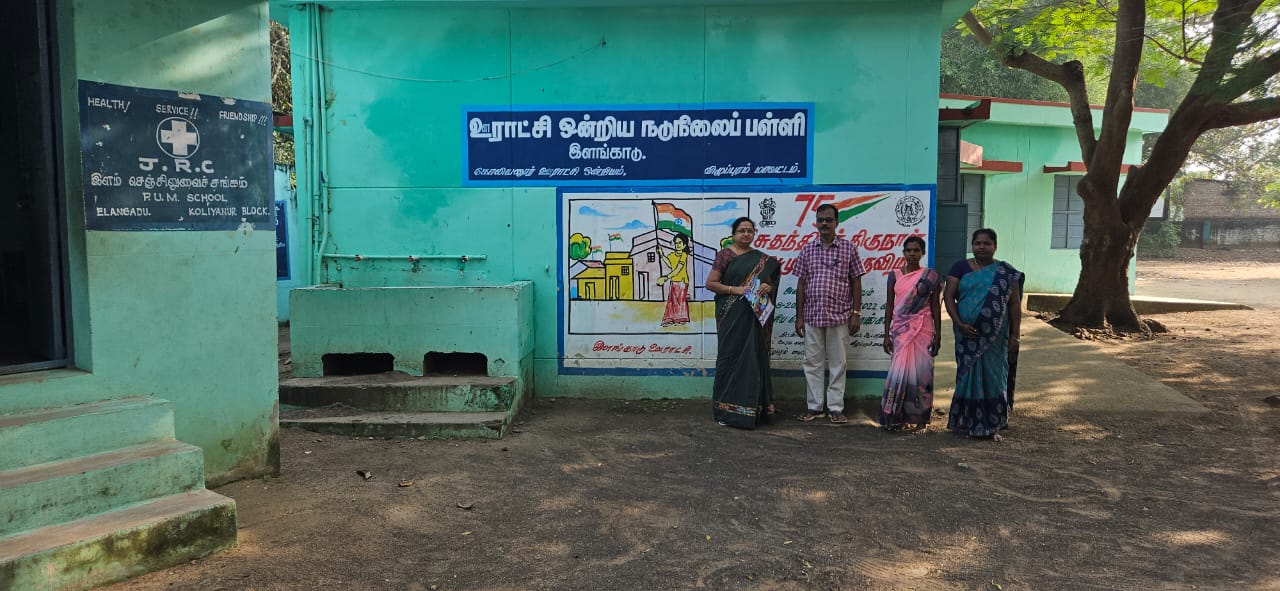
C.M Breakfast Scheme Evaluation 2
C.M Breakfast Scheme Evaluation 2
ICMR Field Investigator with the cooking team at the Panchayat Union Middle School, Ilangadu Panchayat, Villupuram district, as part of the assessment of the Chief Minister Breakfast Scheme
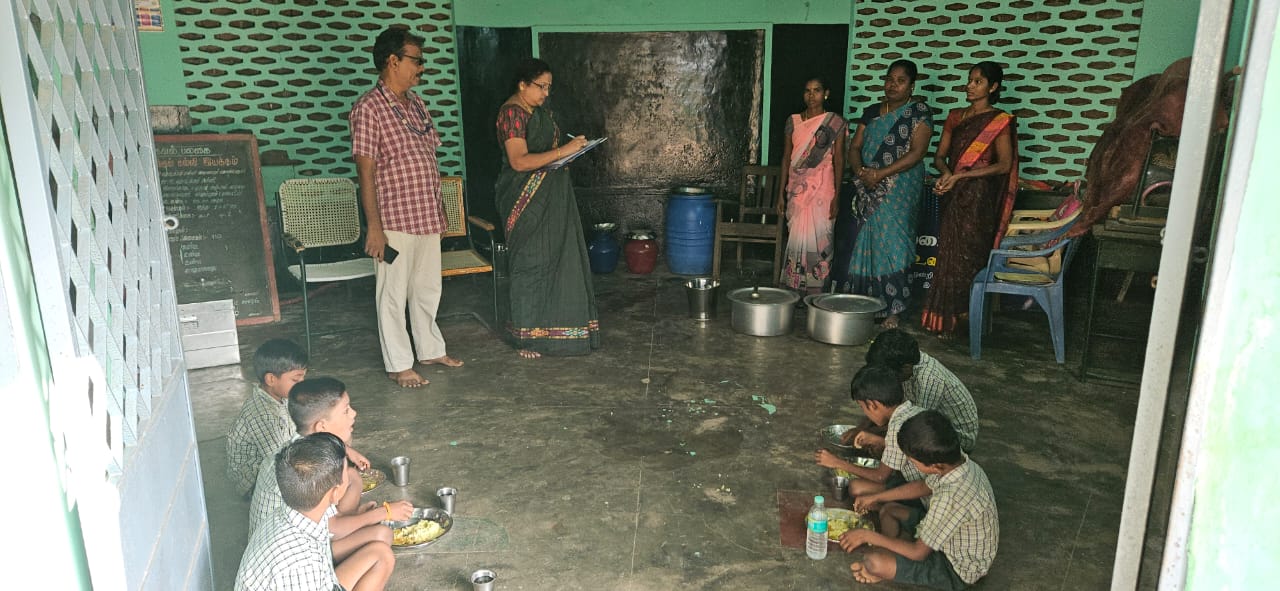
C.M Breakfast Scheme Evaluation 3
C.M Breakfast Scheme Evaluation 3
ICMR Field Investigator assessing the distribution of Morning Breakfast at the Panchayat Union Middle School, Ilangadu Panchayat, Villupuram district, as part of the assessment of the Chief Minister Breakfast Scheme
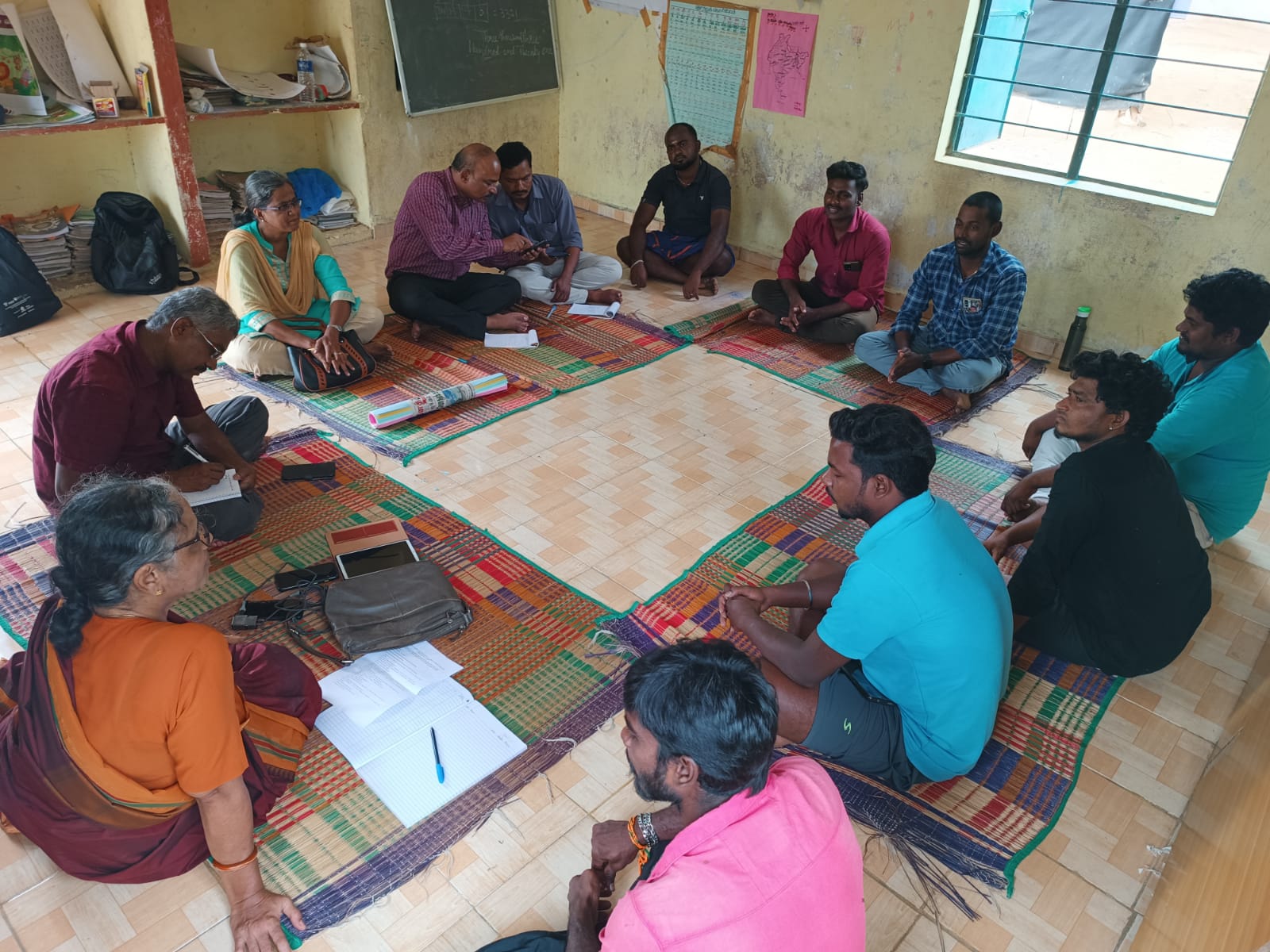
Focus Group Discussion with the young fathers in Pondavakkam village Poondi Block Tiruvallur District
Focus Group Discussion with the young fathers in Pondavakkam village Poondi Block Tiruvallur District
Focus Group Discussion on the importance of First 1000 days in a child’s life with the young fathers in Pondavakkam village Poondi Block Tiruvallur District facilitated by the IRCDS team
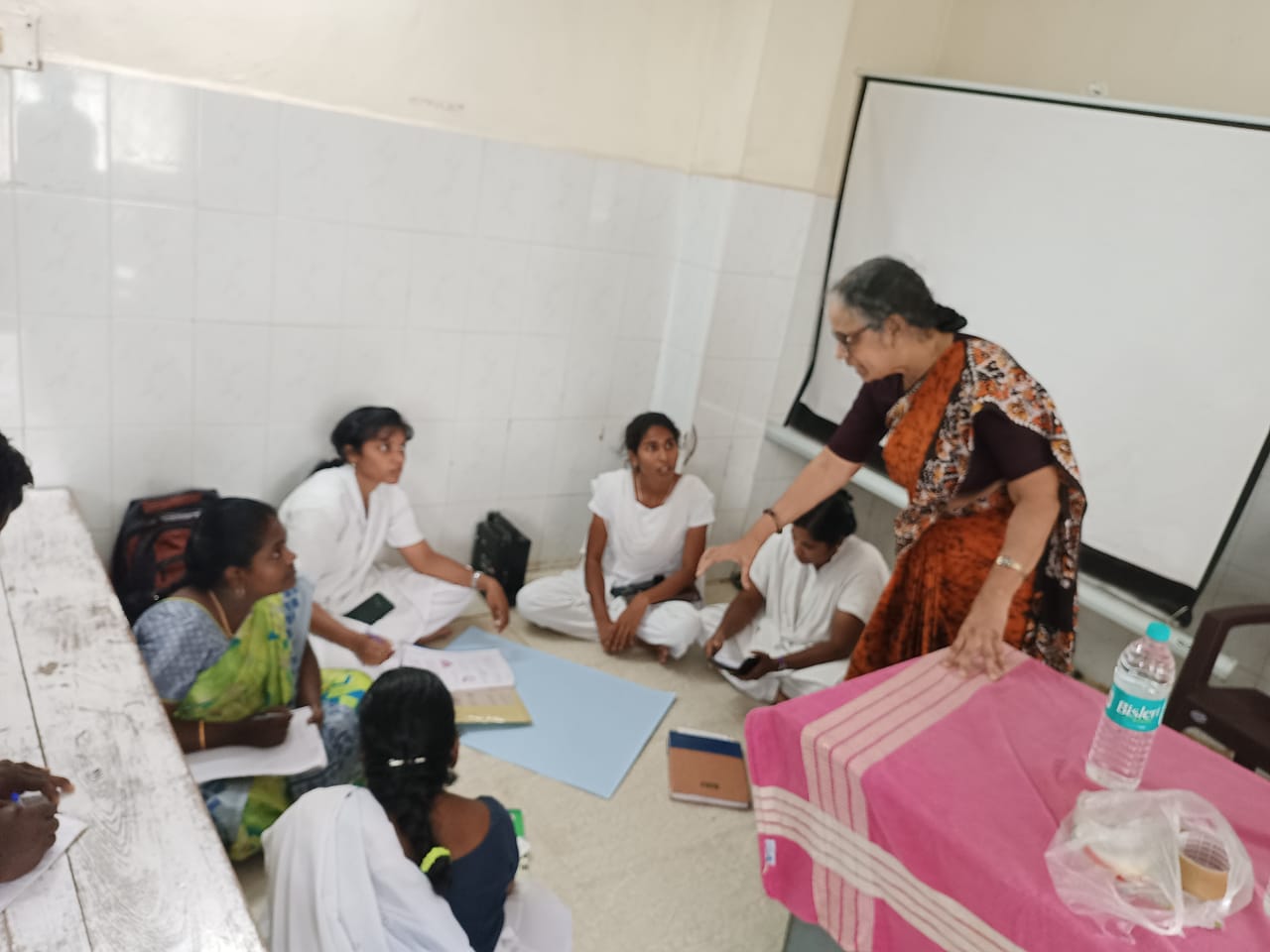
Participatory exercise with the Village Health Nurses in Poondi
Participatory exercise with the Village Health Nurses in Poondi
Participatory exercise with the Village Health Nurses on need for creating awareness on the importance of First 1000 days in a child’s life in Poondi Block Tiruvallur District facilitated by the IRCDS team
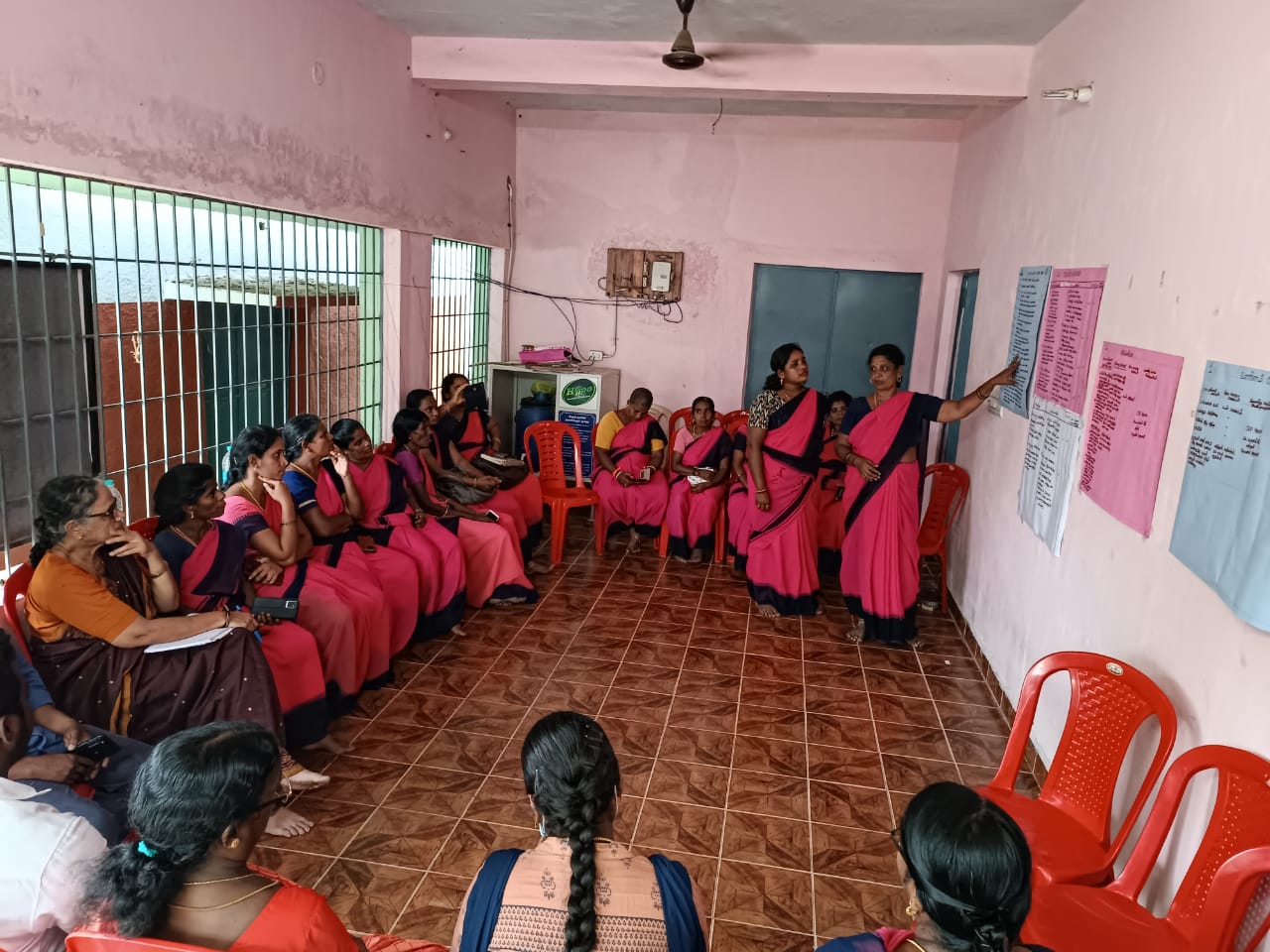
Group discussion exercise among Anganwadi workers in Poondi Block Tiruvallur District
Group discussion exercise among Anganwadi workers in Poondi Block Tiruvallur District
Group discussion exercise among Anganwadi workers in on need for creating awareness on the importance of First 1000 days in a child’s life in Poondi Block Tiruvallur District facilitated by the IRCDS team

